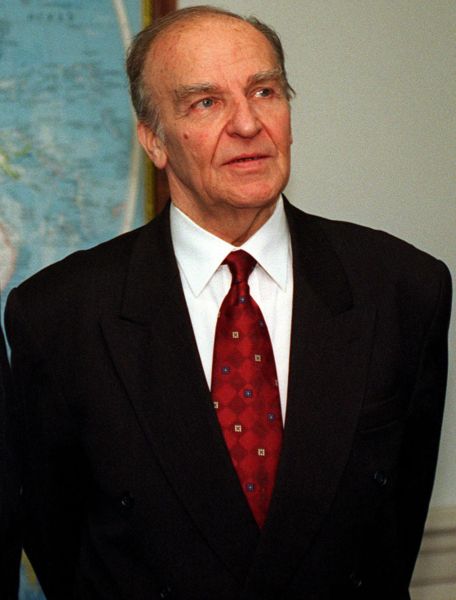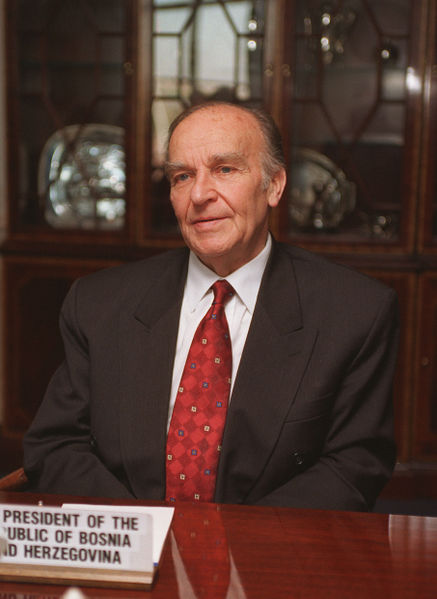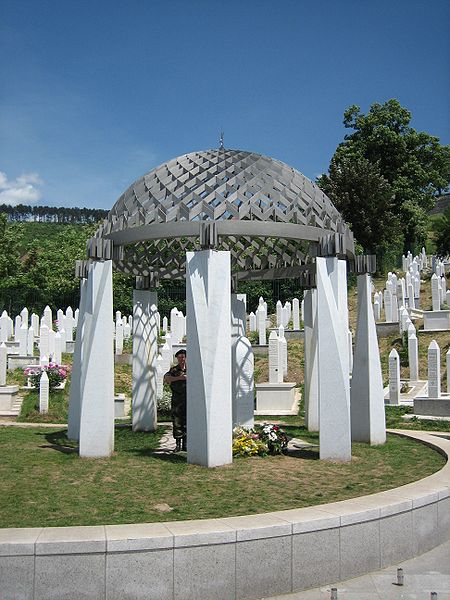<Back to Index>
- Philosopher Francis Hutcheson, 1694
- Painter Théodule Augustin Ribot, 1823
- 1st President of Bosnia and Herzegovina Alija Izetbegović, 1925
PAGE SPONSOR



Alija Izetbegović (Bosnian, in Cyrillic: Алија Изетбеговић; Bosnian pronunciation: [alija izɛtbɛɡɔʋitɕ]) (8 August 1925 – 19 October 2003) was a Bosniak activist, lawyer, author, philosopher and politician, who, in 1990, became the first president of Bosnia and Herzegovina. He served in this role until 1996, when he became a member of the Presidency of Bosnia and Herzegovina, serving until 2000. He was also the author of several books, most notably Islam Between East and West and the Islamic Declaration.
Izetbegović was born in the town of Bosanski Šamac, situated in the north of Bosnia; he was one of five children born to a distinguished but impoverished family descended from former Ottoman aristocrats from Belgrade who fled to Bosnia after Serbia gained independence from the Ottoman Empire. His grandfather, Alija, was the mayor of Bosanski Šamac. While grandfather Alija was a soldier in Üsküdar, he married a Turkish woman called 'Sıdıka Hanım'. After marriage they moved to Šamac and had 5 children. His father, an accountant, declared bankruptcy in 1927 and the family moved to Sarajevo. Izetbegović became closely involved in Bosniak society as he grew up during the 1930s and 1940s. With a devoted family and Muslim upbringing, he received a secular education, eventually graduating from law school in Sarajevo. At this time he also joined the Mladi Muslimani (Young Muslims), a collaborationist "party of Islamic renewal" and youth group that aided refugees during the Second World War. After the war Izetbegović was arrested in 1946 and sentenced to 3 years in prison on charges of collaborationist and anti-communist activities. Once free, he earned a law degree at Sarajevo University and remained engaged in politics.
In 1970, Izetbegović published a manifesto entitled the Islamic Declaration, expressing his views on relationships between Islam, state and society. The authorities interpreted the declaration as a call for introduction of Sharia law in Bosnia, and banned the publication. The declaration remains a source of controversy. It was used by Serb nationalists as one of the excuses for the war, often quoting the declaration as an intent to create an Iranian style Muslim republic in Bosnia. Passages from the declaration were frequently quoted by Izetbegović's opponents during the 1990s, portraying it as an open statement of Islamic fundamentalism. The opinion is shared by some Western authors such as John Schindler. Izetbegović vigorously denied such accusations. British author Noel Malcolm asserted that the Serb nationalist interpretation of the Declaration was false propaganda and offered a more benevolent reading of the declaration. Explaining that it was "a general treatise on politics and Islam, directed towards the entire Muslim world; it is not about Bosnia and does not even mention Bosnia" and that "none of these points can be described as fundamentalist." Malcolm argues that Izetbegović's views were much more thoroughly expressed in his later book, Islam between East and West, where he "tried to present Islam as a kind of spiritual and intellectual synthesis which included the values of West Europe."
Izetbegović wrote what is however regarded as his central work, the book Islam between East and West, in 1980. It explores the notion that "Islam is the only synthesis capable of unifying mankind's essentially dualistic existence".
In April 1983, Izetbegović and twelve other Bosniak activists (including
Melika Salihbegović, Edhem Bičakčić, Omer Behmen, Mustafa Spahić and Hasan Čengić) were tried before a Sarajevo court for
a variety of offences, principally hostile activity inspired by Muslim
nationalism, association for purposes of hostile activity and hostile
propaganda. Izetbegović was further accused of organizing a visit to a
Muslim congress in Iran. All of those tried were convicted and Izetbegović was sentenced to fourteen years in prison. The verdict was strongly criticised by Western human rights organisations, including Amnesty International and Helsinki Watch, which claimed that the case was based on "communist propaganda", and
the accused were not charged with either using or advocating violence.
The following May, the Bosnian Supreme Court conceded the point with an
announcement that "some of the actions of the accused did not have the characteristics of criminal acts"
and reduced Izetbegović's sentence to twelve years. In 1988, as
communist rule faltered, he was pardoned and released after almost five
years in prison. His health had suffered serious and lasting damage. The introduction of a multi-party system in Yugoslavia at the end of the 1980s prompted Izetbegović and other Bosniak activists to establish a political party, the Party of Democratic Action (Stranka Demokratske Akcije,
SDA) in 1989. It had a largely Muslim character; similarly, the other
principal ethnic groups in Bosnia, the Serbs and Croats, also
established ethnically based parties. (The Communist Party renamed
itself the Party of Democratic Changes.) The SDA won the largest share
of the vote, 33% of the seats, with the next runners-up being
nationalist ethnic parties representing Serbs and Croats. Fikret Abdić won
the popular vote for president among the Bosniak candidates, with 44%
of the vote, Izetbegović closely behind with 37%. According to the
Bosnian constitution, the first two candidates of each of the three constitutient nations would be elected to a seven member multi-ethnic rotating presidency (with two Croats, two Serbs, two Bosniaks and
one Yugoslav); a Croat took the post of prime minister and a Serb the
presidency of the Assembly. Abdić agreed to stand down as the Bosniak
candidate for the Presidency and Izetbegović became President. Bosnia's power-sharing arrangements broke down very quickly as ethnic tensions grew after the outbreak of fighting between Serbs and Croats in neighboring Croatia.
Although Izetbegović was due to hold the presidency for only one
year according to the constitution, this arrangement was initially
suspended due to "extraordinary circumstances" and was eventually
abandoned altogether during the war as the Serb and Croat nationalistic
parties SDS and HDZ abandoned the government. When fighting broke out in Slovenia and
Croatia in the summer of 1991, it was immediately apparent that Bosnia
would soon become embroiled in the conflict. Izetbegović initially
proposed a loose confederation to preserve a unitary Bosnian state and
strongly urged a peaceful solution. He did not subscribe to the peace at all costs view and commented in February 1991 that I
would sacrifice peace for a sovereign Bosnia - Herzegovina ... but for
that peace in Bosnia - Herzegovina I would not sacrifice sovereignty. By
the start of 1992 it had become apparent that the rival nationalist
demands were fundamentally incompatible: the Bosniaks and Croats sought
an independent Bosnia while the Serbs wanted it to remain in a rump
Yugoslavia dominated by Serbia. Izetbegović publicly complained that he
was being forced to ally with one side or the other, vividly
characterising the dilemma by comparing it to having to choose between leukaemia and a brain tumour. In January 1992, Portuguese diplomat José Cutileiro drafted a plan, later known as the Lisbon Agreement, that would turn Bosnia into a triethnic cantonal state. Initially, all three sides signed up to the agreement; Izetbegović for the Bosniaks, Radovan Karadžić for the Serbs and Mate Boban for
the Croats. Some two weeks later, however, Izetbegović withdrew his
signature and declared his opposition to any type of division of
Bosnia, supposedly encouraged by Warren Zimmermann, the United States Ambassador to Yugoslavia at the time. In February 1992, Izetbegović called a national referendum on independence for Bosnia as a European condition
for recognition of Bosnia as an independent state, despite warnings
from the Serbian members of the presidency that any move to
independence would result in the Serbian inhabited areas of Bosnia
seceding to remain with the rump Yugoslavia.
The referendum was boycotted by Serbs, who regarded it as an
unconstitutional move, but achieved a 99.4% vote in favour on a 67%
turnout (which almost entirely constituted of the Bosniak and Croat
communities). The Bosnian parliament, already vacated by the Bosnian
Serbs, formally declared independence from Yugoslavia on February 29
and Izetbegović announced the country's independence on March 3. It did
not take effect until 7 April 1992, when the European Union and United States recognised
the new country. Sporadic fighting between Serbs and government forces
occurred across Bosnia in the run-up to international recognition.
Izetbegović appears to have gambled that the international community
would send a peacekeeping force upon recognising Bosnia in order to
prevent a war, but this did not happen. Instead, war immediately broke
out across the country as Serb and Yugoslav Army forces took control of
large areas of Bosnia against the opposition of poorly equipped
government security forces. Initially the Serb forces attacked non-Serb civilian populations in Eastern Bosnia. Once towns and villages were securely in their hands, the Serb forces - the military, the police,
the paramilitaries and, sometimes, even Serb villagers – applied the
same pattern: Bosniak houses and apartments were systematically
ransacked or burnt down, Bosniak civilians were
rounded up or captured, and sometimes beaten or killed in the process.
Men and women were separated, with many of the men detained in the
camps. The women were kept in various detention centres where they had
to live in intolerably unhygienic conditions, where they were
mistreated in many ways including being raped repeatedly. Serb soldiers
or policemen would come to these detention centres, select one or more
women, take them out and rape them. Izetbegović
consistently promoted the idea of a multi-ethnic Bosnia under central
control, which in the circumstances seemed a hopeless strategy. The
Bosnian Croats, disillusioned with the Sarajevo government and
supported militarily and financially by the Croatian government,
increasingly turned to establishing their own ethnically based state of Croatian Republic of Herzeg - Bosnia in Herzegovina and
Central Bosnia. The Croats pulled out of the Sarajevo government and
fighting broke out in 1993. In most areas local armistices were signed
between the Serbs and Croats (Kreševo, Vareš, Jajce). Croat forces started their first attacks on Bosniaks in Gornji Vakuf and Novi Travnik, towns in Central Bosnia on June, 1992, but the attacks failed. The Graz agreement caused deep division inside the Croat community and strengthened the separation group, which led to the Lašva Valley ethnic cleansing campaign against Bosniak civilians. The campaign planned by the self-proclaimed Croatian Community of Herzeg - Bosnia's political and military leadership from May 1992 to March 1993 and erupting the following April, was meant to implement objectives set forth by Croat nationalists in November 1991. Adding to the general confusion, Izetbegović's former colleague Fikret Abdić established an Autonomous Province of Western Bosnia in parts of Cazin and Velika Kladuša municipalities in opposition to the Sarajevo government and in cooperation with Slobodan Milošević and Franjo Tuđman.
Abdić's faction was eventually routed by the Bosnian Army. By this
time, Izetbegović's government controlled only about 25% of the country
and represented principally the Bosniak community. For three and a half years, Izetbegović lived precariously in a besieged Sarajevo surrounded by Serb forces. He denounced the failure of Western countries to reverse Serbian aggression and
turned instead to the Muslim world, with which he had already
established relations during his days as a dissident. The Bosnian
government received money and arms. Following massacres on Bosnian Muslims by Serb and, to a lesser extent, Croat forces, Arab volunteers came across Croatia into Bosnia to join the Bosnian Army. They were organized into detachment called El-Mudžahid. The number of the El-Mudžahid volunteers is still disputed, from around 300 to 1,500. These caused particular controversy: foreign fighters, styling themselves mujahiddin, turned up in Bosnia around 1993 with Croatian identity
documents and passports. They quickly attracted heavy criticism
amplified by Serbian and Croatian propaganda, who considered their
presence to be evidence of violent Islamic fundamentalism at the heart of Europe. However, the foreign volunteers became unpopular even with many of the Bosniak population, because the Bosnian army had
thousands of troops and had no need for more soldiers (especially
controversial ones who could undermine their reputation as a defending
army), but for arms. Many Bosnian Army officers and intellectuals were
suspicious regarding the foreign volunteers arrival in central parts of
the
country, because they came from Split and Zagreb in
Croatia, and were passed through the self-proclaimed Croatian Community
of Herzeg - Bosnia without problems unlike Bosnian Army soldiers who were
regularly arrested by Croat forces. According to general Stjepan Šiber, the highest ranking ethnic Croat in Bosnian Army, the key role in foreign volunteers arrival was played by Franjo Tuđman and Croatian counter intelligence underground
with the aim to justify involvement of Croatia in Bosnian War and mass
crimes committed by Croat forces. Although Izetbegović regarded them as
symbolically valuable as a sign of the Muslim world's support for
Bosnia, they appear to have made little military difference and became
a major political liability. The entity defence minister of the Federation of Bosnia and Herzegovina, Hasan Čengić, was closely associated with Iran and his dismissal in 1996 was a major US demand/condition for the funding and equipping of the Bosnian Federation Army. In
mid 1993, Izetbegović agreed to a peace plan that would divide Bosnia
along ethnic lines but continued to insist on a unitary Bosnia
government from Sarajevo and on the allocation to the Bosniaks of a
large percentage of Bosnia's territory. The war between the Bosniaks
and Croats was eventually ended by a truce brokered with the aid of the
Americans in March 1994, following which the two sides collaborated
more closely against the Serbs. From around this time onwards, NATO became
increasingly involved in the conflict with occasional "pinprick"
bombings conducted against the Bosnian Serbs, generally following
violations of ceasefires and the no-fly zone over Bosnia. The Bosnian
Croat forces benefited indirectly from the military training given to
the Croatian Army by the American military consultancy Military
Professional Resources, Inc. In addition, the Croatians provided
considerable quantities of weaponry to the Bosnian Croats and much
smaller amounts to the Bosnian Army, despite a UN weapons embargo.
Most of the Bosnian Army's supply of weapons was air-lifted from the
Muslim world, specifically Iran - an issue which became the subject of
some controversy and a US congressional investigation in 1996. In
September 1993, the Congress of Bosniak Intellectuals (Drugi bošnjački
sabor) officially re-introduced the historical ethnic name Bosniaks
instead of the previously used Muslim in former Yugoslavia. The Yugoslav Muslim by nationality policy
was considered by Bosniaks to be neglecting and opposing their Bosnian
identity because the term tried to describe Bosniaks as a religious
group not an ethnic one. To quote Bosnian politician and president Hamdija Pozderac: "They
don't allow Bosnianhood but they offered Muslimhood. We shall accept
their offer, although the name is wrong, but with it we'll start the
process." In discussion with Josip Broz Tito (1971). In August 1995, following the Srebrenica massacre, NATO launched
an intensive two week bombing campaign which destroyed the Bosnian Serb
command and control systems. This allowed the Croatian and Bosniak
forces to overrun many Serb-held areas of the country, producing a
roughly 50/50 split of the territory between the two sides. The
offensive came to a halt not far from the de facto Serb capital of Banja Luka.
When the Croat and Bosniak forces stopped their advance they had
captured the power plants supplying Banja Luka's electricity and used
that control to pressure the Serb leadership into accepting a cease
fire. The parties agreed to meet at Dayton, Ohio to
negotiate a peace treaty under the supervision of the United States.
Croatian and Serbian interests were represented by President Tuđman and
President Milošević respectively. Izetbegović represented the
internationally recognised Bosnian Government. Izetbegovic's intent was
to continue the war, and continued to arm even afterwards, although lack of US support put a stop to this. After the Bosnian War was formally ended by the Dayton peace accord in November 1995, Izetbegović became a Member President of Presidency of Bosnia and Herzegovina. His party's power declined after the international community installed a High Representative to
oversee the affairs of state, with more power than the presidents or
parliaments of either the Bosniak - Croat or Serb entities. He stepped
down in October 2000 at the age of 74, citing his bad health. However,
Izetbegović remained popular with the Bosniak public, who nicknamed him Dedo (which in Bosnian means granpa). His endorsement helped his party to bounce back in the elections of 2002. He died in October 2003 of heart disease complicated by injuries suffered from a fall at home. Alija Izetbegović died in October 2003 in Sarajevo. Following his death there was a drive to rename a part of the main street of Sarajevo from Ulica Maršala Tita (Marshall Tito Street) and the Sarajevo International Airport in his honour. Following objections from politicians from Republika Srpska, the international community, and UN envoy Paddy Ashdown,
both initiatives failed. His grave at the Kovači cemetery in Sarajevo
was badly damaged by a bomb on the morning of 11 August 2006. The
identity of the bomber or bombers has not been determined. French philosopher Bernard-Henri Lévy described Izetbegović's wartime career in a favorable documentary called Bosna! In October 2006, his son Bakir (born 1956) was elected to a four-year term in the Parliament of Bosnia and Herzegovina as a representative of the SDA. Four years later, in October 2010, he too was elected to the Presidency as the Bosniak member. Serb nationalists and institutions twice petitioned the ICTY to indict him on war crimes and other charges. An ICTY investigation of Izetbegović was started, but terminated when he died.